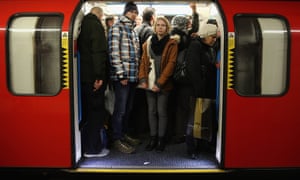Commuters are more likely to be anxious, dissatisfied and have the sense that their daily activities lack meaning than those who don’t have to travel to work even if they are paid more. Those were the findings of a study by the Office for National Statistics looking at commuting and personal wellbeing.
The study analysed personal wellbeing using four measures: life-satisfaction, to what extent the respondent felt the things they did in life were worthwhile, whether the commuters were happy and whether they were anxious. A drop in the first three and a rise in anxiety indicates a negative effect on the person’s wellbeing.
It found that each additional minute of commuting time made you feel slightly worse up to a certain point. However, strangely, once a commute hit three hours then the negative effects dropped off.
The effect was relatively small in the scheme of overall wellbeing but was judged by the ONS to be statistically significant.
Does the travel mode make a difference to your personal wellbeing?
The analysis compares people whose main travel to work mode is a private vehicle such as a car, minibus or works van with those whose main travel to work mode is an alternative such as train, bus, walking or cycling. The results show that those travelling to work by bus or coach had lower levels of life satisfaction and a lower sense that their daily activities were worthwhile on average than those using a private vehicle to commute to work.
It may not come as a surprise to anyone who’s experienced squeezing into a packed train on their way to work that people who take the train to work recorded higher anxiety levels on average than those who travelled in a private vehicle.
The analysis also found that people who walk to work had lower life satisfaction and a lower sense that their activities were worthwhile on average than those who commute to work using a private vehicle.
But as the ONS rightly state: “the daily commute to work is likely to be experienced as a total package”, so what happens when you combine travel time and mode? The ONS broke travel time (one way) into two categories; 16 to 30 minutes and longer than 30 minutes. For the analysis, the ONS included each mode of transport in combination with each of the two time categories. In each case, the comparison is with people who commute between one and fifteen minutes to work (one way) via any travel method. The key findings are:
- Those travelling to work in a private vehicle had lower levels of happiness and higher anxiety levels on average for all journey times (that is, both 16-30 minutes and over 30 minutes)
- People spending between 16 and 30 minutes cycling to work had lower happiness levels and higher anxiety on average
- Those making long bus journeys to work of more than 30 minutes had lower life satisfaction, a lower sense that daily activities are worthwhile, lower happiness levels and higher anxiety
- People commuting more than 30 minutes by train had higher anxiety levels on average
- Those walking between 16 and 30 minutes to work had lower life satisfaction, a lower sense that daily activities are worthwhile and lower happiness levels on average. People walking more than 30 minutes to work had higher anxiety levels on average.
But, the ONS are keen to highlight, there were several forms of commuting that were no worse for personal wellbeing on average than a short commute of up to 15 minutes, holding all else equal. These included:
- Riding a motorbike, moped or scooter for up to 30 minutes (though beyond this point happiness was negatively affected)
- Cycling for more than 30 minutes (cycling less than 30 minutes was associated with lower happiness and higher anxiety)
- Travelling by taxi (regardless of journey time)
- Taking the train, underground, light railway or tram for up to 30 minutes (beyond this, the sensethat activities are worthwhile was significantly lower and anxiety significantly higher).
Does higher pay make up for the frustration?
This is all well and good but given how people, especially in London, tend to increase their commute as they progress in their career then perhaps the higher salary makes up for it?
Not so, according to the report, which says the following:
Given the loss of personal wellbeing generally associated with commuting, the results suggest that other factors such as higher income or better housing may not fully compensate the individual commuter for the negative effects associated with travelling to work and that people may be making sub-optimal choices. This result is consistent with the findings of previous studies such as Stutzer and Frey (2008). This is potentially important information both for those who commute, particularly for an hour or more, and for their employers.
However, it does add that those financial benefits being passed onto other members of the commuters’ household might make for a happier home. So commuters really could be sacrificing themselves for other people’s happiness.
Download the data
More open data
Data journalism and data visualisations from the Guardian
Can you do more with this data?
- Contact us at data@theguardian.com
- Follow us on Twitter
- Like us on Facebook


View all comments >